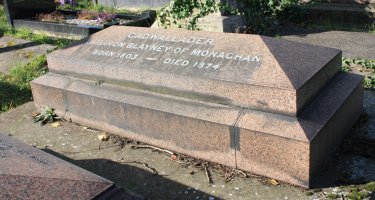Cadwallader Davis Blayney, 12th Lord Blayney
Born 19th Dec 1802
Baron from 8 Apr 1834 [62]
Died 18th Jan 1874 in London "without issue"See Ancestry.
After being expelled from military college for misconduct about 1819 [93], he probably attended Trinity College, University of Dublin as he was an Alumni member 1825 to 1863 [24].
He became the 12th Lord Blayney in 1832 on the death of his father Andrew
He held the office of M.P. (Conservative) for County Monaghan between 1830 and 1834 and the office of Representative Peer [Ireland] between 1841 and 1874 [91], [85]. However, William Carpenter criticised his performance, stating "This is his first appearance in parliament, and we cannot meet with his name, except amoung the votes in favour of sir H. Parnell's motion. He refused to make any promises to his constituents, or to declair his political priciples, and only obtained his election by the manœuvres of the orange faction!" [478]
In 1853 he sold Castleblayney and lands to Henry Thomas Hope of Deepdene, Surrey. Hope is best-remembered for his ownership of the 'Hope Diamond' [08]. However, Cadwallader continued to own property in Tipperary (1,561 acres in 1870) but apparently lived in London (address as Carlton Club, London) [05].
He had no male heir and died unmarried without issue in 1874 at age 71 at St. James's Hotel, Piccadilly, London. He is buried at Kensal Green Cemetry, London. He left money to erect five alms houses, to house local poor in Monaghan [17]. Funds bequeathed by Lord Blayney provide for an undergraduate scholarship at Queen's University, Belfast. [92]
The Lord Blayney title has remained dormant since 1874, with a number of attempts to lay claim to the title. A rather large review on the topic was made by the eminant historian and researcher Edward Rowley-Morris in 1877 [35] who was not successful in establishing a reputable claim for anyone. Furthermore, he notes "It was not a question of succession to any estates or other property, as the deceased nobleman left him surviving a sister Anne...." [p3].
As best as I can determine, no male heir seems probable from any Lord Blayney other than the first, namely his next brother, Sir Arthur Blayney (1603-1659), which is what Rowley-Morris tried to find. However he spent considerable time researching non-male lines of the second son, Henry (which also leads us to Arthur Blayney (1716-1795), the last Blayney Gregynog heir. The male descendents of the third son of Sir Arthur (1603-1659), Arthur Blayney are never satisfactorally identified and so hold a significant potential for a canditate. There are five children to his first wife, Mary Forbes [Edward, Richard, Henry and 2 unkowns], apparently 6 offspring to his second wife Jane Smothergill and the possibility of a third wife (Lady Sterling of Ireland), with an unknown number of sons. See Edward1.html, [35].
Of course, now that there is a reasonanly established the link between my Blayney ancestor (Thomas ap Ieuan BLAYNEY) and known members of the Blayney aristocracy (Thomas was also the Grandfather of the 1st Baron, Edward), there is no shortage of other Blayneys also not a direct descendant, not to mention the fact that I have a number of cousins descended from my grandfather's older brother, not to mention a couple of older brothers of my own.... :-)
Keith Blayney
Cadwallader Davis Blayney grave
Kensal Green Cemetery (London)
